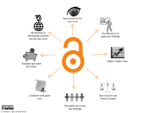This week, we highlight a survey by Taylor & Francis you can take part in on the use of PLS in research publications. We read about how PLS can increase diversity, equity, inclusion and accessibility in scholarly publishing. We also read about PLS research presented at ISMPP EU 2023, including an Open Pharma analysis on the use of PLS metatags in PubMed. We hear about new UK guidance for the use of social media by pharma companies, and we read some thoughts from OASPA on the state of open access at the start of 2023. Finally, we listen to a podcast on the future of open science.
To take part in:
Gaining insights into the use of PLS in the publication of research via Survey Monkey
Plain language summaries (PLS) are short, accessible and peer-reviewed summaries of journal publications that are written in non-technical language. The aim of PLS is to allow a broad audience to understand and engage with the latest research. To learn more about the use of PLS in medical research publications, Taylor & Francis is inviting you to share your insights through its PLS survey! You can take the short survey using the link above.
To read:
How do PLS increase diversity, equity, inclusion and accessibility in scholarly publishing? via Learned Publishing | 25-minute read
Published in the Association of Learned and Professional Society Publishers Learned Publishing journal, this opinion article outlines and describes the evidence for the value of PLS for increasing diversity, equity, inclusion and accessibility, and the current and future challenges of developing PLS.
Research into PLS presented at ISMPP EU 2023 via Plain Language Summaries | 3-minute read
In this blog, Jacqui Oliver (Medical Writer at Envision Pharma Group) and Open Pharma’s very own Adeline Rosenberg share some of the work on the use of PLS they presented at ISMPP EU 2023. Jacqui’s work looked at how many articles published in PLS-accepting journals actually submitted PLS alongside their article, as well as how discoverable the PLS were in relation to the article. Adeline’s work analysed whether PLS hosted on figshare were being shared via social media and news websites. You can find out what Jacqui’s and Adeline’s research revealed by e-visiting the posters!
Assessing PubMed metatag usage for PLS discoverability via Open Pharma | 5-minute read
Joining the fun at ISMPP EU 2023, Open Pharma also presented research on PLS in scientific research publications. Focusing on PLS discoverability, this research aimed to find out whether PubMed records correctly use the PLS metatag and, if not, to find out the reasons why. We found that, despite increasing use of the PLS metatag, only 0.01% of PubMed records used the tag, with 14.6% of these using it incorrectly. We also wanted to establish the open access status of the journals and articles that were using the tag, and we found that all PLS on PubMed are published in journals with open access options and more than half are published in gold open access journals.
New social media guidance for pharma companies via PMCPA | 3-minute read
The Prescription Medicines Code of Practice Authority (PMCPA) has published new guidance for pharma companies to help them ensure their use of social media remains compliant with the Association of the British Pharmaceutical Industry (ABPI) code of practice. Developed by the PMCPA alongside the Medicines and Healthcare Products Regulatory Agency, ABPI and pharma companies, the guidance also sets standards for how pharma companies provide information about prescription-only medicines to the public. You can read the full guidance here.
Thoughts on the state of open access in 2023 via OASPA | 12-minute read
As we enter into the second month of 2023, this blog post by Malavika Legge (Programme Manager for the Open Access Scholarly Publishing Association [OASPA]) gives her thoughts on the health and fitness of the open access movement. She covers a range of topics, including global open access, article processing charges, the need for equity in publishing, and the impact of authors favouring international journals with perceived greater prestige in lieu of local journals.
To listen to:
The future of open science via Apple Podcasts Preview | 18-minute listen
In this episode of the All Things SciComm podcast, Nikesh Gosalia (Senior Vice President of Global Academic and Publisher Relations at Cactus Communications) and Mark Hahnel (CEO and Founder of figshare) discuss the future of open science. Join them as they talk about what incentivizes researchers to participate in open science, the need for paid peer review and the future of figshare. You can listen to other episodes of the All Things SciComm podcast here!
Have you read the December 2022 issue of Medical Writing about Open Science and Open Pharma? Read the full issue here!






